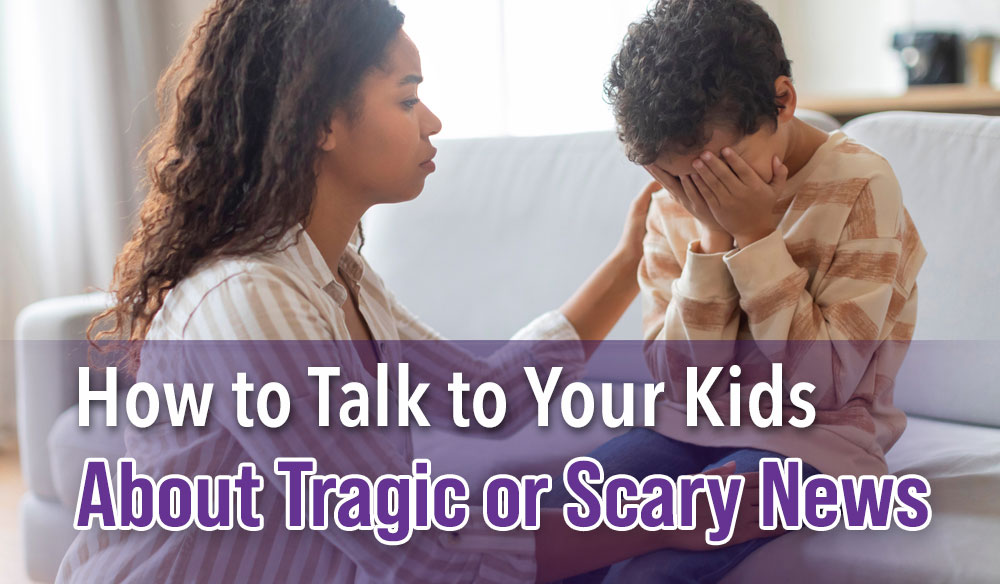How to Talk to Your Kids About Tragic or Scary News
The old journalism adage, “If it bleeds, it leads,” is pretty on point.
We are used to videos and newscasts that focus first on the salacious and shocking. The feel-good story about some good Samaritan who saved a toddler from a well is often deep into the newscast or relegated to a latter page of a newspaper.
It’s been that way forever. Since we’re adults, we can handle the weight of war updates, news of terrorist threats, and weather catastrophes. But what about our children?
Depending on their age and circumstances, many now have greater access to constant news, a barrage of information that pulses through phones or tablets. Everything has changed since we were young. Information hits them at breakneck speed – but they are kids. Many aren’t equipped to handle tragic news of violence and graphic images of a neighborhood swept away in a tornado.
In 2020, our kids’ lives were changed by a worldwide pandemic, with shocking revelations, newscasts with on-screen death trackers (thanks for nothing, CNN), along with dire (and often inaccurate) predictions and misinformation. They saw their worlds rocked as schools shuttered, and proms and graduations were cancelled. Now, there’s ongoing talk about World War III, terrorism, gang violence, and just days ago, the tragic loss of life in a devastating Texas flood. Little children were swept away in an instant. You are probably holding yours a little closer when you think about the families who discovered they’d lost precious ones that somber morning.
Confronted by staggering tragedy in the news, some children immediately wonder if it will happen to them, or to their house, or to their family. Your 10-year-old may seem mature to you, but much of this may be beyond what they can fully comprehend, considering their developmental stage and limited life experience. Did you know that several studies reveal that more than half of students have a significant fear of school violence? I recall when my own daughter, who graduated in 2016, spoke often about her fear that a shooter might attack her school.
These are anxiety-making stories, so we’re sharing some things to consider as you help your kids understand and process tragic and scary news.
Take Their Temperature
If you’ve decided to talk with your child about a particular event, start with some questions. Ask them first what they have heard about it. Let them talk as much as they wish before you say much. If your kids are very young, you should share very little with them. Only needed facts. Then offer reassurance that they are safe. If you have teens, you may delve into more detail with them and answer their more in-depth questions. Whatever the age, take the temperature before diving into too much scary or disturbing information. Protect your children as much as you can.
Time Your Talk
As the news breaks and you feel emotional, don’t rush into talking to your kids about it (unless they are in the room and you need to address it immediately). Instead, give yourself a moment, a few hours – or even a few days, if needed – to learn the facts and prepare emotionally to explain a tragic or scary situation. Ensure your emotions have calmed so you can talk, listen, and process effectively with your child.
It’s okay to show feelings; however, it’s best to avoid an emotional spiral in front of your child, as they may then feel less safe. You are their protector, so if you are unhinged, it could be upsetting.
One more thing about timing. Make sure you can take the time needed. Don’t do a parenting fly-by on the way out the door. Arrange for unrushed, uninterrupted time. Leave your phone in another room and give your son or daughter your undivided attention. For some kids, it may be a short conversation, for others, they may need longer to process through talking, asking questions, or even having a good cry. Be there, patiently and lovingly engaged.
Tailor Your Talk
Your discussion of the Texas floods, the attempted assassination of President Trump before last year’s election, or a school shooting will be different if you are talking with an 8-year-old compared to a teenager. How much you should share will vary.
In an article titled “How to Help Your Children Process Tragic News,” from Focus on the Family, Dr. Danny Huerta advised that very young children (0-3) “feed off the emotions they perceive.” Because of that, he recommended that conversations about news stories occur without the child being present. He explained that ages 4-8 will often move quickly past a news story, perhaps only briefly asking a question about whether it affects them. Children in the 9-12 age range process things a bit more deeply, still primarily focused on whether the tragic event could happen in their world.
Teens are often able to discuss things on a deeper level with you. They can also engage more with the call to pray for those affected and discuss politics or other related concerns. It could be helpful to discuss the news, including how it was presented, its accuracy, any errors, and any other notable nuances. These can be opportune moments to help your older teens develop discernment when it comes to what they see online.
Tell the Truth
Though you may limit how much you share with your kids, tell them the truth. Spin is everywhere, and they need to know that you will always be honest with them. This will help them process in a real way, instead of having been offered a less tragic — but—untrue version. You want to avoid overwhelming your child with too much detail, but it’s never helpful to lie to them. It sets a negative precedent in their lives.
Let Them Feel
Hopefully, you have already processed your feelings. Allow your child to have a moment, too, and don’t discourage tears, anger, or even a moment of fear. Provide your comforting presence, a warm hug, and understanding reassurance. There will be time to talk more after their initial feelings are expressed, and your children need to know that you’ll listen to them, even if they feel emotional.
I’m reminded of the school shooting at the Covenant School in Nashville back in 2024. Three 9-year-old children and two adults were savagely gunned down by a transgender-identified girl. If your kids had heard about it and were gripped with fear that it might happen to them at their school, it would be understandable that emotions might be stirred in the wake of this tragedy.
Your child should be confident that when talking with you, it’s okay to express sadness, anger, frustration, or even worry. You are there to help them navigate these moments – not to deny them.
Offer Hope and A Way to Cope
One of the best ways to give your child strength and resilience is to instill faith in God. If you encourage and facilitate a strong and vibrant spiritual life in your family, you have the best place to go for comfort, guidance, and encouragement – God’s Word.
Stories in the Bible recount tragedies, crimes, heartache, and pain – and also tell of God’s Love and Provision. It talks about what happens after death – and the bright hope of Heaven. Jesus offers forgiveness, truth, restoration, and unending love.
Authentic faith in our unfailing God is the absolute best gift you can give your children, and a lifeline when tragedy strikes. There may be a local tragedy or one that’s far away, like the Texas flood. Teach your kids about praying for others, and pray together as a family.
Consider other ways to lend tangible support, like the 9-year-old twins from Fort Worth, Corrigan and Cannon Camp, who raised more than $5,000 with a lemonade stand to benefit the flood-ravaged Camp Mystic. Model generosity by giving financial support or volunteering in relief efforts. It is instructive and encouraging for your kids to learn that they, too, can make a difference, just like you.
Mamas, you are the best judge of when these discussions should happen and how much you should share with your kids. They rely on your guidance, your wisdom, and your willingness to process difficult news with them. We all wish we could spare our children from the harsh realities coming at them from the internet and 24-hour news sources. We do what we can, knowing that if we hold them close and help them work through these unavoidable realities, we are giving them a fertile path to develop character, conscience, and clarity.
Podcast Note: You won’t want to miss our timely conversation about helping young people thrive in a digital world with Tracy Vittorini of Teen Edge and her son, Caden Vittorini, author, speaker, and founder of Vitt Factor.
***




